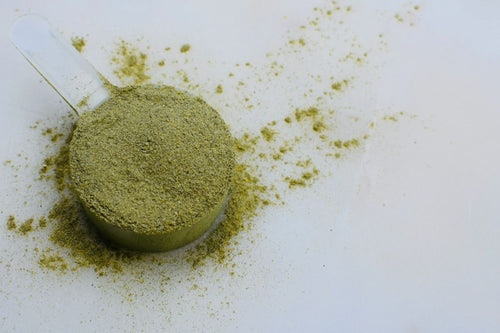
Key Takeaways:
- Dogs can eat mushrooms, but some varieties are toxic and can be lethal for them.
- Safe medicinal mushrooms for dogs include chaga, lion's mane, turkey tail, cordyceps, reishi, maitake, shiitake, tremella, and phellinus.
- Mushrooms offer health benefits for dogs, such as improved digestion, boosted immune system, increased energy, better coat and skin health, reduced inflammation, weight loss support, improved breath, reduced cancer risk, and enhanced cognitive function.
- Avoid toxic mushrooms like Amanita, death cap, fly agaric, false morels, and inky cap mushrooms to protect your dog from poisoning.
- Always seek immediate veterinary attention if you suspect mushroom poisoning in your dog.
Anyone who has a dog knows that they often start out as the family pet, but end up as a family member!
Humans and dogs have a special and unique bond - they’ve been in our ‘tribes’ for millennia and aren’t called ‘man’s best friend’ for nothing!
As such, we all want to make sure our four-legged friends live the best life possible - staying happy and healthy for as long as they can.
Even though we like to think of our dogs as family members, they often can't eat the same foods as our human family members (can dogs eat almond butter?... how about chocolate?... or grapes?)
Can Dogs Eat Mushrooms?
Yes, they definitely can! As with humans though, there are certain mushrooms that are not safe to eat for dogs. According to the Pet Health Network, a good general rule is that if they are sold in large grocery stores, they are generally safe for dogs. But it's still important to verify their safety and non-toxicity before offering them to your furry friend, regardless of where you get them.
Now, while we can’t provide an exhaustive list of everything dogs can or cannot eat, we can highlight that one highly beneficial addition to your dog’s diet is mushrooms—particularly medicinal mushrooms!

They can help improve digestion, boost the immune system, increase energy levels, improve coat and skin health, reduce inflammation, aid in weight loss, reduce bad breath, reduce the risk of cancer and improve cognitive function.
Medicinal mushrooms have been used in human cultures around the world for thousands of years and have been extensively studied in recent years for their potential health benefits for humans and animals alike.
If you ask me, everyone should be adding medicinal mushrooms to their own diet, and their dog's diet as well!
What Mushrooms Are Safe for Dogs?
-
Chaga Mushroom: Rich in antioxidants, chaga mushrooms are believed to have immune-boosting properties and can be given to dogs in small amounts.
-
Lion's Mane Mushroom: Lion's mane mushrooms have been known to support brain health and enhance cognitive function in both humans and dogs.
-
Turkey Tail Mushroom: The turkey tail mushroom is often used for its potential anti-cancer properties and immune-boosting effects. It can be beneficial for dogs as well.
-
Cordyceps Mushroom: Cordyceps mushrooms have been used in traditional medicine for their potential ability to improve energy levels and stamina. These mushrooms are generally safe for dogs.
-
Reishi Mushroom: Reishi mushrooms have been linked to various health benefits, including supporting the immune system and reducing inflammation. Dogs can safely consume reishi mushrooms in moderation.
-
Maitake Mushroom: Maitake mushrooms are packed with vitamins and minerals and are believed to have immune-boosting properties. Dogs can enjoy the benefits of maitake mushrooms as part of a balanced diet.
-
Shiitake Mushroom: Shiitake mushrooms are commonly used in cuisine and are safe for dogs to eat. These mushrooms are rich in B vitamins and have potential anti-inflammatory properties.
-
Tremella Mushroom: Tremella mushrooms are known for their hydrating and moisturizing effects on the skin. While they are generally safe for dogs, it's best to give them in small amounts.
-
Phellinus Mushrooms: Phellinus mushrooms have been studied for their potential anti-cancer properties and can be included in a dog's diet in limited quantities.
-
Portobello Mushroom: This popular mushroom is not only delicious for humans but also safe for dogs. It is a good source of vitamins B and C, as well as minerals like potassium.
-
White Button Mushroom: Another safe option for dogs is the white button mushroom. It is a great source of protein and contains essential vitamins and minerals. Plus, it is known to be rich in vitamin D2, which helps with calcium absorption.
-
Oyster Mushroom: Oyster mushrooms are safe for dogs and provide various health benefits. They are high in antioxidants, and fibre, and contain natural compounds that support the immune system.
Which Mushrooms Are Bad for Dogs?

While the above-mentioned mushrooms are safe for dogs, there are several types of mushrooms that you should keep your furry friend away from:
-
Amanita Mushrooms: Amanita mushrooms are highly toxic to both humans and dogs. Ingesting them can lead to liver failure and even death.
-
Death Cap Mushrooms: Just as their name suggests, death cap mushrooms are extremely toxic and can be lethal if consumed by dogs. These mushrooms should be avoided at all costs.
-
Fly Agaric Mushrooms: Fly agaric mushrooms contain toxins that can cause hallucinations, seizures, and even death in dogs. It's important to prevent your dog from coming into contact with these mushrooms.
-
False Morels: False morels, also known as Gyromitra mushrooms, can be toxic to both humans and dogs. These mushrooms contain a toxin that affects the central nervous system and can be fatal.
-
Inky Cap Mushrooms: Inky cap mushrooms, also called Coprinus, can be toxic to dogs. Ingesting them can cause an adverse reaction and should be avoided.
Remember to always consult with your veterinarian before introducing any new foods or supplements into your dog's diet. They can provide you with personalized advice based on your dog's specific needs and health conditions.
15 Of The Best Health Benefits Of Mushrooms For Dogs
1. They can help improve your dog's digestion
Mushrooms are a great source of fibre, which can help to regulate your dog's digestive system.
If your pup is suffering from a sensitive stomach, diarrhea, or constipation, adding mushrooms to their diet may relieve them.
2. They can boost your dog's immune system
Mushrooms are packed with antioxidants, vitamins and other beneficial compounds that can help to strengthen your dog's immune system.
This is especially true for the highly-revered medicinal mushrooms such as turkey tail, reishi, chaga, lion’s mane, shiitake & tremella.
Veterinarian, Dr Andrew Jones, gives a great discussion in the video below on the benefits of turkey tail mushroom for dogs, particularly surrounding cancer treatment.
3. They can help increase your dog's energy levels
If your dog seems sluggish or doesn't have much energy, mushrooms can be a great addition to their diet.
The nutrients in mushrooms can help to increase your dog's energy levels and make them feel more lively.
4. They can help improve your dog's coat and skin
Mushrooms are a good source of fatty acids, essential for maintaining a healthy coat and skin.
If your dog has dry or flaky skin, adding mushrooms to their diet may help to improve their condition.

5. They can help to reduce inflammation
Mushrooms contain a number of compounds that can help to reduce inflammation in the body. This can benefit dogs who suffer from arthritis or other joint conditions.
Inflammation can also lead to other health problems, so reducing it can help your dog feel better overall.
6. They can aid in weight loss
If your dog is overweight, mushrooms can be a helpful addition to its diet. The fibre in mushrooms can help your dog feel fuller for longer and reduce their overall calorie intake.
Mushrooms are also low in fat and calories, making them great weight-loss food.

7. They can help to improve your dog's breath
Mushrooms are natural antibacterial food that can help to reduce bad breath in dogs.
If your pup has a smelly mouth, adding mushrooms to their diet may be the solution you've been looking for.
8. They can help to reduce the risk of cancer
Mushrooms contain compounds that have been shown to help reduce cancer risk in humans - particularly reishi and turkey tail. Some of these compounds have also been effective in preventing cancer in dogs.
Adding mushrooms to your pup's diet shows promise when dealing with this horrible disease, and may be a powerful preventative measure.
9. They can improve cognitive function
Mushrooms contain compounds that can help improve cognitive function in both humans and animals.
If your dog is starting to show signs of cognitive decline, such as forgetfulness or confusion, adding mushrooms to their diet may help to improve their condition.
NOTE: Lion’s mane mushroom is particularly good for this.

10. They are a natural and healthy food
Many standard dog foods lack a number of quality nutrients that your dog needs. Mushrooms are a natural and healthy food that can provide numerous benefits for your dog.
They are low in calories and fat and high in fibre and nutrients. This makes them an ideal addition to anyone’s diet - including your furry friend.
11. They are a great source of antioxidants
Mushrooms are a great source of antioxidants, which can help to protect your dog's cells from damage and oxidation.
This is important for maintaining overall health and preventing diseases in all humans and animals.
12. They are a good source of vitamins and minerals
Mushrooms are a great source of many essential vitamins and minerals, such as vitamin C, vitamin D, potassium, and zinc.
This means that they can provide your dog with various essential nutrients that they may not be getting from their other food sources.

13. They come in a variety of different flavours & textures
Mushrooms come in various textures and flavours, so if your dog is a fussy eater, there is still a good chance you can find one your pup will love.
There are many options like white button mushrooms, portobello mushrooms, oyster mushrooms, etc. - so no one goes hungry!
14. They are easy to add to your dog's diet
Mushrooms are super easy to add to your dog's diet - especially if they are a liquid extract or powdered.
You can also easily give them whole fresh mushrooms or cook them as well - just see what your dog likes!
15. They have a long shelf life
If you’re keen to try powdered or liquid extracts of medicinal mushrooms - you’ll find that they have a very long shelf life.
You can easily stock up and keep them on hand to make sure you don’t run out, or have them available for whenever your pup particularly needs them. This makes them a convenient and easy-to-use food that you can always have on hand.

What Are the Symptoms of Mushroom Poisoning in Dogs?
If your dog has eaten a poisonous mushroom, it’s important to watch out for certain symptoms. These symptoms can vary depending on the type and amount of mushroom ingested.
Common signs of mushroom poisoning in dogs include vomiting, diarrhea, drooling, abdominal pain, difficulty breathing, excessive thirst, jaundice, seizures, and even coma or death.
It’s crucial to remember that symptoms may appear within a few hours or even be delayed for several days, so immediate veterinary attention is necessary if you suspect your dog has consumed a toxic mushroom.
What to Do if You Suspect Your Dog is Affected by Mushroom Toxicity?
If you suspect that your dog has ingested a toxic mushroom, it is crucial to seek immediate veterinary attention. Delaying treatment can have severe consequences, as mushroom toxicity can vary in its effects from mild illness to potentially fatal outcomes.
Make sure to contact your veterinarian right away and carefully follow their guidance on what steps to take.
In some situations, the veterinarian might induce vomiting to eliminate as much of the mushroom as possible from your dog’s system. They may also administer activated charcoal to absorb any remaining toxins.
Depending on the seriousness of the poisoning, your dog may need additional treatments like intravenous fluid therapy, medication for liver support, or other supportive care.
Always remember that swift and appropriate medical intervention is best when dealing with mushroom toxicity in dogs.
Best Way To Feed Your Dogs Mushrooms:
- Offer as a novel treat: While not all dogs may enjoy mushrooms, some might find them tasty and exciting as a new treat. However, it's important to note that dogs don't need mushrooms in their diet.
- Stick to store-bought: When it comes to offering mushrooms to your dog, it's best to stick to store-bought options. Choose raw and organic mushrooms to ensure their safety.
- Clean and cook thoroughly: Before feeding mushrooms to your dog, be sure to wash and clean them properly. Cooking them in small amounts of dog-friendly oil, like organic coconut oil, can enhance their palatability.
- Nutrient-packed option: Consider adding mushrooms to bone broth and slow-cooking it for a long time. This mushroom-infused bone broth can be a great addition to your dog's food.
- Incorporate shiitake mushrooms: Buy dried shiitake mushrooms or dry them yourself, then grind them using a spice mill or blender. You can add a daily dose of this powdered shiitake mushroom to your dog's dinner.
FAQs about Mushrooms for Dogs
There are a lot of questions surrounding mushrooms and dogs - particularly about which ones are safe. We will dive into a few of them below for you:
Why can't dogs eat mushrooms?
While dogs can eat certain mushrooms, there are many types that are highly toxic to them. Dogs lack the necessary enzymes to break down some of the compounds found in mushrooms, which can lead to various health issues.
In addition, there are several species of mushrooms that contain toxins that can cause liver damage, kidney failure, and even death in dogs. It's best to err on the side of caution and avoid letting your dog eat any mushrooms.
Can dogs eat wild mushrooms?
No, dogs should never be allowed to eat wild mushrooms. Wild mushrooms can be extremely dangerous and even deadly for dogs. The majority of mushroom species found in the wild are not safe for consumption by dogs, and it can be challenging to accurately identify which mushrooms are toxic. Even a small amount of certain wild mushrooms may cause severe poisoning in dogs.

Can dogs eat cooked mushrooms?
Dogs can eat mushrooms both raw and cooked - it depends on what your dog prefers! As with humans, all dogs are different so it is worth noting how your dog responds after raw mushrooms though as they can be a little harder to digest.
Cooked mushrooms can also be safer for dogs to consume as the cooking process breaks down some of the compounds that can be harmful to them. Do note that not all cooked mushrooms are safe for dogs. Seasonings, oils, and other ingredients used in the cooking process can also be harmful.
What happens if a dog eats store-bought mushrooms?
Store-bought mushrooms that are safe for human consumption are generally safe for dogs as well. These mushrooms have undergone quality control measures and are less likely to contain harmful toxins.
Nevertheless, it’s important to keep in mind that every dog is unique and may have individual sensitivities or allergies. If your dog consumes store-bought mushrooms and experiences any unusual symptoms like vomiting, diarrhea, or abdominal pain, it’s advisable to consult with a veterinarian.
Can dogs eat cream of mushroom soup?
While cream of mushroom soup may be a delicious treat for humans, it's not recommended to feed it to dogs. Most canned or processed soups, including cream of mushroom, contain a variety of ingredients that are not suitable for dogs. These can include seasonings, additives, high levels of sodium, and other potentially harmful substances.
Can dogs smell mushrooms?
Yes, dogs have an incredible sense of smell and can detect the odour of mushrooms. They have been known to sniff out mushrooms during walks or while exploring the outdoors. However, just because a dog can smell mushrooms doesn't mean they should eat them.

That’s It!
Mushrooms are a versatile food for both us and our dogs. and the use of medicinal mushrooms can help.
They are a great natural and healthy food that can provide numerous benefits for all. Mushrooms are low in calories and fat, high in fibre and nutrients and packed with beneficial compounds that can help with a huge range of diseases and ailments.
Adding mushrooms to your dog's diet is a simple and easy way to improve their overall health.
So - click the links in this article to grab some amazing medicinal mushrooms for both yourself and your furry friend, and help keep everyone healthy and happy for as long as possible!














